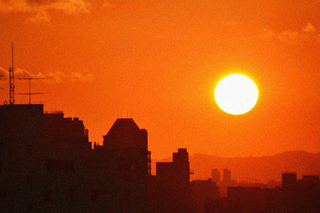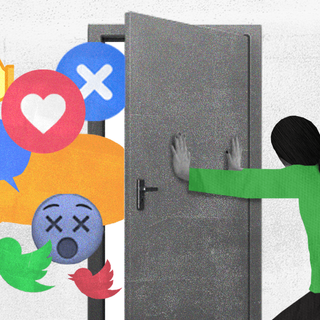
How Heatwaves Can Make Us Irritable, Angry, and Even Prone to Suicidal Thoughts
“What has been noticed also is that there is an increase in suicide rates — not just suicidal attempts — but death by suicides.”

India’s summers are not just overwhelmingly hot, but also hotter than their predecessors, almost every year. By now, we know heatwaves impact us physiologically — through heatstrokes, dehydration, and exhaustion, among others. What remains relatively unexplored and far less known is the impact of heatwaves on individual mental health.
Turns out, there’s growing evidence — anecdotally and as scattered data — that people experience worse moods during extreme heat. The Intergovernmental Panel on Climate Change’s Sixth Assessment Report noted, “Increases in heat extremes that are related to climate change pose diverse risks to mental health globally, ranging from altered affective states to increased mental health-related hospital admissions and suicidality.” The report identified children, adolescents, and people with pre-existing mental health challenges to be more at risk. As we continue to cope with the mass trauma that Covid19 inflicted across the globe, that last part is rather alarming.
Offering an explanation for the link between extreme heat and mental health, Mimansa Singh Tanwar, a clinical psychologist at Fortis Healthcare in India, told Mint Lounge, “[When] you are getting exposed to something again and again, which is not conducive, it is going to have an impact on your mental health, and it is going to make you more predisposed to having a mental illness.”
There is also an association between heat waves making people irritable and angry. Beyond the instinctive exasperation, people feel at the heat and humidity, heatwaves may also be linked to social volatility. A 2013 study also found evidence of increasing temperatures leading to a rise in violence among people — perhaps, attest to this effect. With temperatures rising more and more with each passing year, the findings are concerning.
Related on The Swaddle:
Eco‑Anxiety Is Fuelled by Helplessness, Anger. Can We Turn Our Grief Into Climate Action?
“Given the large potential changes in precipitation and temperature regimes projected for the coming decades… amplified rates of human conflict could represent a large and critical social impact of anthropogenic climate change in both low- and high-income countries,” the study authors had noted.
That’s not all. “What has been noticed also is that there is an increase in suicide rates — not just suicidal attempts — but death by suicides,” Ruksheda Syeda, a Mumbai-based psychiatrist, said last month.
Data from a 2018 study published in Nature Climate Change, too, found a link between rising temperatures and increased rates of suicide — even going on to suggest that the impact of climate change on suicides may be comparable to the impact of economic recessions on self-harm.
This study had further analyzed more than 600 million messages on Twitter to find that a rise in temperatures also predicted an increase in the usage of “depressive terms” — such as “alone,” “bleak,” “lonely,” and “trapped.”
Yet, despite the impact of climate change on mental health, less than 1% of more than 50,000 medical research papers on climate change in the last decade explored mental health-related ramifications, as per review by a 2021 study. “The gap between knowing the impacts and being able to quantify the impacts … is holding us back,” Emma Lawrance, part of the medical faculty at Imperial College London, who led the report, told Reuters.
Related on The Swaddle:
Youth Shouldn’t Have to Fix Climate Problems Created by Older Generations: German Court
Marginalized communities, experts believe, are going to be the most impacted by climate change, even in terms of mental health issues. This could eventually work to “exacerbate inequality,” according to Lawrence. “If you have lost your home, if you’re at risk of repeated flooding, if you’re grieving because you’ve lost a family member to a fire or your livelihood because of a drought, that is shock and trauma that translates for some into very prolonged distress and diagnoses of PTSD [post traumatic stress disorder], anxiety, depression and increased risk of suicide,” she explained.
The lack of research at the intersection of mental health and the environment perhaps betrays a bias against the interests of those at the lowest rung of socio-economic interests — as always, sidelining the suffering of the socio-economically deprived.
Hopefully, to prevent Earth from becoming like the alien planet in Rick and Morty‘s “Look Who’s Purging Now,” governments and policymakers will stop neglecting the issue. Failing which, one can imagine our planet devolving into a state where every day — rather than a designated one, as in the show — is observed as the “day of purge,” courtesy of the anger, irritability, and disregard for life that heatwaves inspire.
“The climate and ecological emergency is a mental health emergency. Our mental health is entwined with the health of our natural world,” Dr. Adrian James, president of the Royal College of Psychiatrists in the U.K., warned.
Devrupa Rakshit is an Associate Editor at The Swaddle. She is a lawyer by education, a poet by accident, a painter by shaukh, and autistic by birth. You can find her on Instagram @devruparakshit.
Related


Just a Week‑Long Break From Social Media Can Reduce Anxiety, Depression: Study
